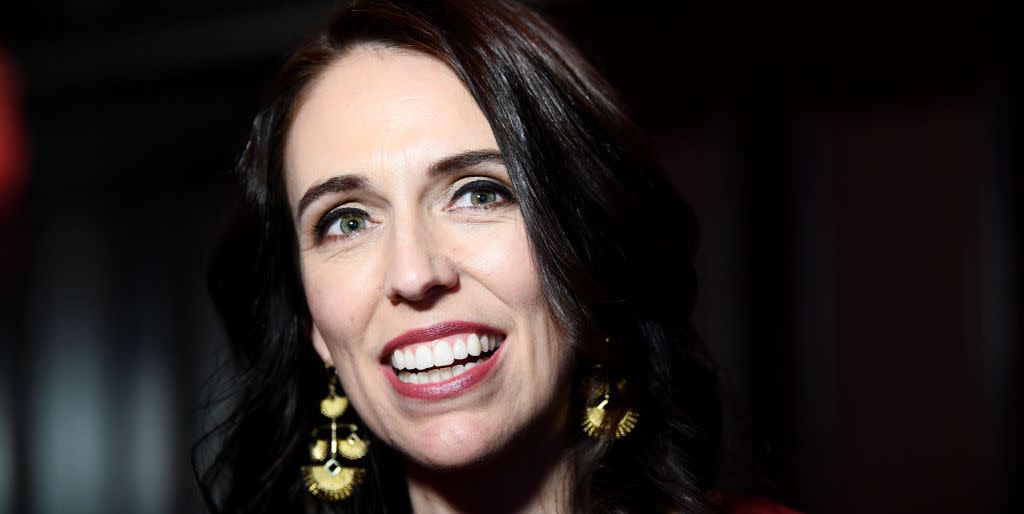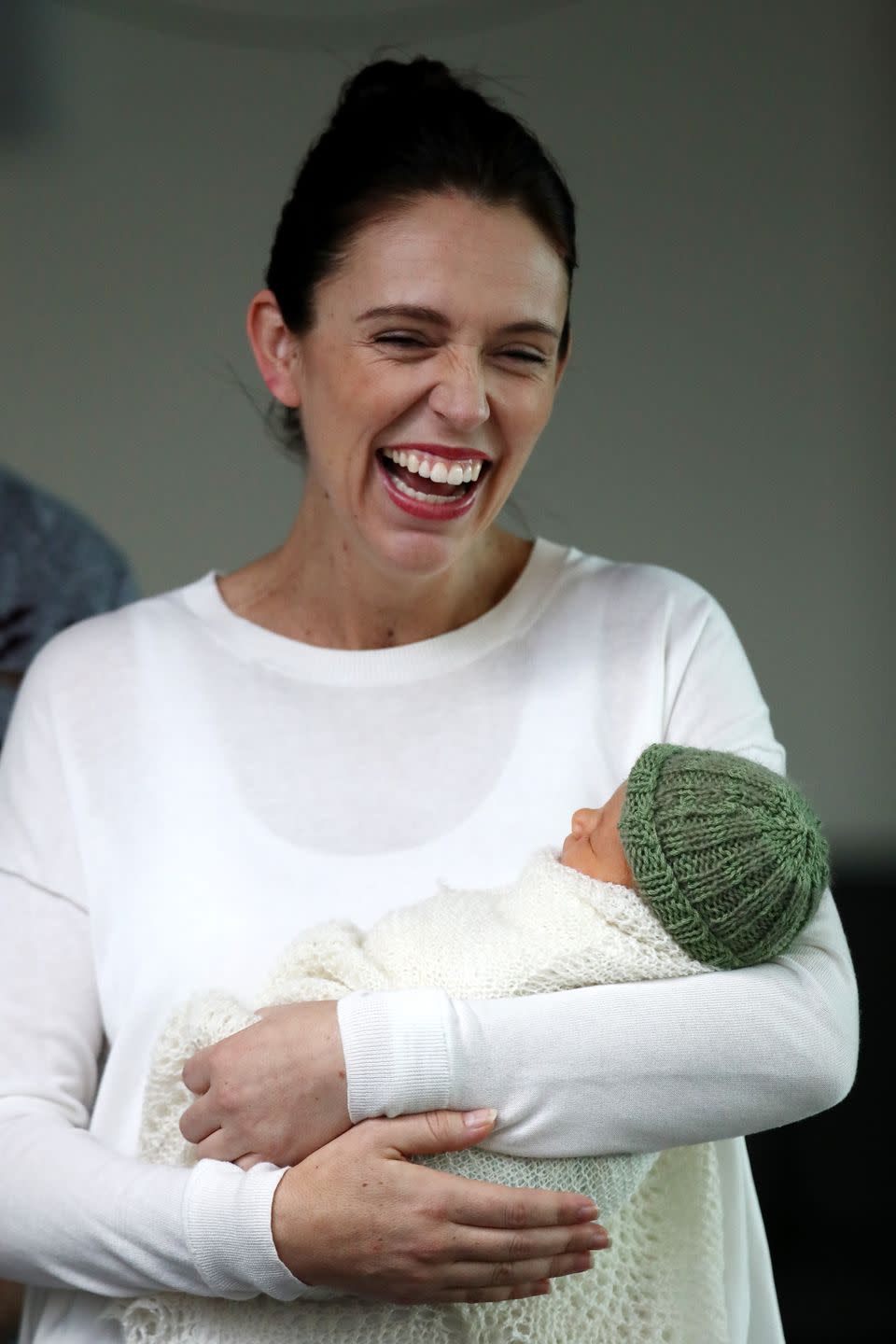The Importance Of Knowing When To Walk Away

There is a scene from Love Actually that has stuck with me above all others through my adult life. The long-suffering Andrew Lincoln (playing Mark) professes his undying love to Keira Knightley (Juliet) on her doorstep via a series of placards – and as he walks away, resolutely says to himself: 'Enough. Enough now.'
Rather than the heartbreak, romance or sheer ridiculousness of the scene, it's this little final phrase that has echoed backwards and forwards in my head at many of the major junctures in my life – when I, like Mark, have realised it's all gone a bit far, and that it's time to bow out and move on.
I'd like to think New Zealand's Prime Minister, Jacinda Ardern had something similar in her mind when she announced her shock resignation yesterday, after almost six years in office. Revealing plans for her departure during a press conference, Ardern gave a heartfelt speech explaining her decision: 'I am leaving because with such a privileged role comes responsibility – the responsibility to know when you are the right person to lead, and also, when you are not. I know what this job takes, and I know that I no longer have enough in the tank to do it justice. It is that simple.'

We've endured a farcical number of far less graceful resignations in the UK over the past few months, but that's not the only reason Ardern's hit differently. On the world stage, her resignation is a huge loss for the decisive yet empathetic politics that the 42-year-old Prime Minister spearheaded throughout her career – and drew great admiration for employing through back-to-back national crises, to impressive effect. Of course, it's also a huge loss for female representation in politics, as well as senior leadership roles more generally.

But what I felt following her resignation speech, above all, was a profound admiration for Ardern, who, as I see it, has told the world how important it is to know when to say, 'Enough. Enough now.'
'I know there will be much discussion in the aftermath of this decision as to what the so-called "real" reason was,' her speech continued. 'The only interesting angle you will find is that after going on six years of some big challenges, that I am human. Politicians are human. We give all that we can, for as long as we can, and then it’s time. And for me, it’s time.'
We have been conditioned to see quitting as a failure, or an act of defeat – and in some cases, it can be (see: Liz Truss). But Ardern's decision was a thought-out, much reasoned and wise move involving an assessment of her role, and whether she has the capacity to fulfil it.
'There was an utter respect for me listening to Ardern's speech,' says Averil Leimon, a leadership psychologist at White Water Group. 'You could see that she has reviewed her successes, taken stock of how many crises she's been through, and weighed it all up – not just her career, but her life, her family and her personal wellbeing too.'
It's something we should all be doing regularly, but on the whole, we aren't. 'From our research, we found that women have often stayed in positions longer than they should have, out of a misguided loyalty, and because they don't want to let people down,' explains Leimon. 'When instead, it should be: "this isn't working for me, I'm going to weigh it all up, and do something differently."'
Quitting might once have been seen as a dramatic, drastic act that follows a big bust-up at work or the arrival of some disagreeable new boss, but more and more it's the result of such a re-assessment of priorities. As the pandemic changed the very concept of work-life balance and introduced a new style of 'agile working', it forced us all to really think about what matters most – and work wasn't often it.
What followed was the so-called 'Great Resignation', that continues still today. 'There's a kind of hang-over from the past few years which is still affecting us,' says Leimon. 'It's making people tired and anxious, and even a little agoraphobic, but above all it's making people realise that things can be done differently. For the past century or so, business has been done in a particular way and it is a very male model of how it should work. It's been successful, and therefore it's been sustained. But now, people of all ages have gone, "Hmm, look at me, I'm working from home, and they said this was impossible." It's started a paradigm shift in which people have realised that the rules we've been abiding by don't actually need to be there.'
Instead, we're making work work for us – and if it doesn't, we shouldn't be afraid of simply walking away. Writer and creative Alex Holder did exactly that, quitting her 'dream job' as a partner at a large global advertising agency, and never looked back. 'I finally reached the job I thought would make me happy, and it didn't,' explains Holder. 'Suddenly, I was managing people rather than getting to come up with ideas. Morally, I was being asked to work with brands I didn't entirely align with, and the lifestyle wasn't fun. My love for creating brand work died, and it's really hard to lead when you just don't care.'
'Initially when I quit, I felt petrified, talentless, a failure and lost,' she continues. 'But very quickly I felt liberated, free and brave as more opportunities came up. Staying would have affected my wellbeing way more than quitting did.'
It's an empowering move, one that allows us to regain control, look at our lives holistically and make positive change – be it spending more time with family, as Ardern plans to do, focusing on our own wellbeing, learning to put ourselves first, go down an entirely new route, or even make the great leap into nothing. If the woman who became the world's youngest female head of government aged 37 can openly (and calmly) say she has 'no plan' and 'no next steps', then perhaps it's not so terrifying after all.
The legacy Jacinda Ardern leaves behind is vast, many-pronged and immeasurably important, but in her signature, down-to-earth style, she closed her resignation with a profound lesson for us all: 'I hope... I leave behind a belief that you can be kind, but strong. Empathetic, but decisive. Optimistic, but focused. That you can be your own kind of leader – one that knows when it’s time to go.'
You Might Also Like


